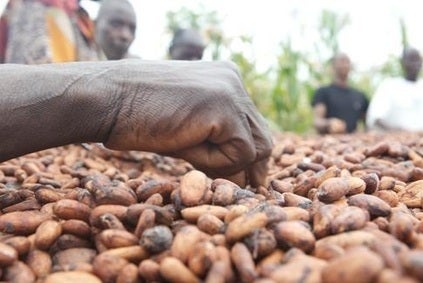
As the 2nd World Cocoa Conference takes place this week in Amsterdam, a major subject of discussion will be the CocoaAction programme which was launched last month by 12 major cocoa and chocolate companies and was formally presented to the conference this morning (11 June).
CocoaAction, which sees the companies establish common targets and work more closely together on raising productivity and improving livelihoods of cocoa farmers in Cote d’Ivoire, Ghana and eventually other countries, was hailed by World Cocoa Foundation chairman Barry Parkin as “one of the most significant steps the sector is taking to make cocoa sustainable”.

Discover B2B Marketing That Performs
Combine business intelligence and editorial excellence to reach engaged professionals across 36 leading media platforms.
The initiative has been cautiously welcomed by Frank Mechielsen, policy advisor at Oxfam Novib, the Netherlands affiliate of the charity, as a “positive signal”.
Mechielsen told just-food: “The commitment of the industry to share strategy and objectives related to sustainable cocoa is a positive signal. Besides the productivity and quality agenda, attention is provided to community development and child labour remediation. It shows the sense of urgency the companies show to address the challenges and work on solutions together.”
In particular, Mechielsen welcomed the fact that gender parity has been included for the first time in a major sustainability initiative. In its “Behindthebrands” campaign last year, Oxfam sought to increase pressure on companies such as Mars, Nestle, Mondelez, all of which are part of the CocoaAction programme, to improve the position of women farmers and workers in their cocoa supply chains.
However, Mechielsen also voiced some concerns. “There is currently only limited public information available about CocoaAction. So many details are unknown. The 12 companies aim to reach 300,000 farmers in 2020, but it remains unclear how many new farmers they will reach and what is the overlap with their existing individual or joint World Cocoa Foundation projects.”

US Tariffs are shifting - will you react or anticipate?
Don’t let policy changes catch you off guard. Stay proactive with real-time data and expert analysis.
By GlobalDataHe also said that given that there are some 5.5m cocoa farmers in the world and the seven traders and processors in the CocoaAction programme source around 3m metric tonnes of cocoa, around 75% of the global supply, from some 3m farmers, the 2020 objective was “unambitious”.
“So in 2020 they will reach 10% of their target group,” he said. “This does not look ambitious.”
Mechielsen was also concerned that the programme did not include any representation from other stakeholders such as farmers, cooperatives, NGOs, unions and certifiers. “It is worrisome that in the initial consortium or technical group, none of these stakeholder groups were represented.”
In a recent interview with just-food Bill Guyton, president of the World Cocoa Foundation, the industry organisation that is coordinating the CocoaAction programme, was asked about the lack of non-industry participation.
Guyton said that while there were no NGO signatories to the CocoaAction plan, there had been “strategic discussions with NGO stakeholders”, particularly with regard to community investment. He said that he also anticipated more engagement with NGOs as the programme moves into the implementation stage.
Another area where Oxfam is seeking greater clarity is around the precise roles the companies and government organisations will be taking and the ratio between government and private-sector funding.
Guyton told just-food that the measurement and assessment processes being built into the programme represented a key strength but Mechielsen said more information was required about how results would be presented and how progress would be monitored.
“Oxfam is looking forward to receive more information about the programme and together with our allies provide input,” Mechielsen said in conclusion.
The CocoaAction initiative has also been welcomed by Nick Weatherill, executive director of the International Cocoa Initiative (ICI), the multi-stakeholder organisation set up as part of the Harkin Engel Protocol to address child labour in cocoa supply chains.
The ICI had been an advisor in the formation of the CocoaAction initiative and will itself launch a new strategy this week.
Weatherill said: “The International Cocoa Initiative (ICI) welcomes the unprecedented commitment by the cocoa industry to coordinate itself, aligning individual companies’ sustainability actions and investments for maximum impact. ICI applauds the strong focus on child labour monitoring, remediation and other social dimensions, and recognises the invaluable potential for this initiative to advance the principle of collective action and shared responsibility between industry, civil society and origin governments.”





